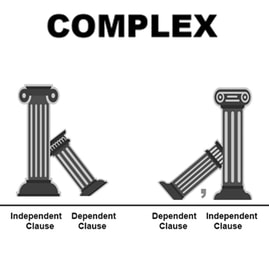2.3 Complex Sentences
E1 - Explanation
These complex sentences begin with an independent clause (a phrase that expresses a complete thought and a complete sentence, containing a subject, verb, and object), then use a subordinating conjunction to begin the dependent clause (a phrase that is not a complete sentence).
Complex sentences beginning with independent clauses usually do not need commas unless the contrast between the two clauses is very strong.
You can also begin the sentence with a dependent clause. Notice that in this case you should use a comma (,) between the two parts of the sentence. You can see that the dependent clauses still begin with a subordinating conjunction.
|
We have looked at compound sentences in Grammar Lesson 1.5. They contain two independent clauses, connected by one of the 7 English coordinating conjunctions (FANBOYS).
|
Complex sentences contain an independent clause and at least one dependent clause. Notice the little comma in between when the dependent clause comes first!
|
E2 - Examples
Simple sentences: Julia shops at E-Mart. She also buys groceries at Lee Plus.
Compound sentences: Julia shops at E-Mart and she also buys groceries at Lee Plus.
E-Mart is larger, but Lee Plus is cheaper.
Complex sentences: Julia mainly shops at E-Mart, although she also buys groceries at Lee Plus.
Even though Lee Plus is cheaper, she prefers E-Mart's bigger selection of food.
Compound sentences: Julia shops at E-Mart and she also buys groceries at Lee Plus.
E-Mart is larger, but Lee Plus is cheaper.
Complex sentences: Julia mainly shops at E-Mart, although she also buys groceries at Lee Plus.
Even though Lee Plus is cheaper, she prefers E-Mart's bigger selection of food.

E3 - Exercises
It's your turn!
Which of these sentences are correct complex sentences?
Remember, complex sentences contain subordinating conjunctions with their subordinate clauses.
You have learned the FANBOYS rule for coordinating conjunctions
– but what is a subordinating conjunction?
They are words which help us to connect phrases that contain dependent, or supporting, ideas to the main (independant) idea in the sentence. Here are some (but not all!) of the most common English subordinating conjunctions:
than, rather than, whether, as much as, whereas, that, whatever, which, whichever, after, as soon as, as long as, before, by the time, now that, once, since, till, until, when, whenever, while, though, although, even though, who, whoever, whom, whomever, whose, where, wherever, if, only if, unless, provided that, assuming that, even if, in case (that), lest, how, as though, as if, because, since, so that, in order (that), that, as …
Let’s find the subordinating conjunctions in these complex sentences!
a) A baby horse, or ‘foal’, is able to stand as soon as it is born.
b) Unless you fasten your seatbelt, I’m not going to start driving.
c) After your girlfriend’s birthday party, would she like to go to the noraebang?
d) Professor Kang gave a lecture on good study skills which was poorly attended.
e) In case we forget, and before we leave for vacation, we should probably write my sister a note about taking care of the plants.
f) David played his harp for Saul even though the king did not always appreciate the music.
g) I’ve given up studying now that the midterm is finished.
h) Perfume and scented products must be used lightly in public, due to others’ allergies.
i) Whenever Suzanne visits Venice, she always buys far too many glass sculptures.
- Emily enjoys drawing with coloured pencils.
- Even if I fail this class, I will have learned something from it.
- The cats were fighting for a long time.
- It soon became quiet, for everyone had gone to bed.
- The violinists had decided; they would refuse to play the new symphony.
- Snack foods are rarely healthy, but they are delicious!
- Since Brosnan retired, they have found no one worthy to play the role of 007.
- Why couldn’t you be polite while my brother was visiting?
- Pizza is amazing, lasagna is great, and spaghetti is wonderful.
- Difficulties in writing are often easily overcome by practice.
Remember, complex sentences contain subordinating conjunctions with their subordinate clauses.
You have learned the FANBOYS rule for coordinating conjunctions
– but what is a subordinating conjunction?
They are words which help us to connect phrases that contain dependent, or supporting, ideas to the main (independant) idea in the sentence. Here are some (but not all!) of the most common English subordinating conjunctions:
than, rather than, whether, as much as, whereas, that, whatever, which, whichever, after, as soon as, as long as, before, by the time, now that, once, since, till, until, when, whenever, while, though, although, even though, who, whoever, whom, whomever, whose, where, wherever, if, only if, unless, provided that, assuming that, even if, in case (that), lest, how, as though, as if, because, since, so that, in order (that), that, as …
Let’s find the subordinating conjunctions in these complex sentences!
a) A baby horse, or ‘foal’, is able to stand as soon as it is born.
b) Unless you fasten your seatbelt, I’m not going to start driving.
c) After your girlfriend’s birthday party, would she like to go to the noraebang?
d) Professor Kang gave a lecture on good study skills which was poorly attended.
e) In case we forget, and before we leave for vacation, we should probably write my sister a note about taking care of the plants.
f) David played his harp for Saul even though the king did not always appreciate the music.
g) I’ve given up studying now that the midterm is finished.
h) Perfume and scented products must be used lightly in public, due to others’ allergies.
i) Whenever Suzanne visits Venice, she always buys far too many glass sculptures.
E5 - External Links
https://7esl.com/subordinating-conjunctions/ contains an extensive list and some graphics.





